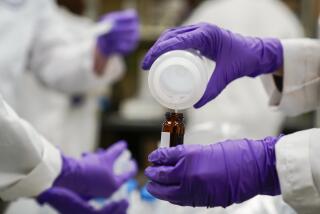GE Will Acquire Borg-Warner’s Chemical Operations for $2.31 Billion
- Share via
STAMFORD, Conn. — General Electric Co. will buy Borg-Warner Corp.’s chemical business for $2.31 billion in cash in a deal announced Thursday that will help Borg-Warner pay off the huge debts acquired in going private last year.
The deal will also swell the size of GE’s rapidly growing plastics business, which will do sales of nearly $3 billion this year.
“This is a big-time deal,” said Nicholas P. Heymann, an analyst for Drexel Burnham Lambert Inc. in New York.
“It’s a risk-free area (for GE) and it’s not controversial,” he added.
Chicago-based Borg-Warner will use the proceeds to reduce the debt it took on last year in a $4.7-billion leveraged buyout to avoid a takeover by GAF Corp.
In a leveraged buyout, the assets of the company being acquired are mortgaged to pay for the acquisition.
Borg-Warner took on bank debt of $3.4 billion in going private and has been reducing it through proceeds from asset sales.
Borg-Warner said it will have no trouble meeting the agreement with banks to repay their loans by the end of 1988. “It’s a slam dunk,” Donald Trauscht, chief financial officer, said in an interview Thursday.
The Borg-Warner chemical business, headquartered in Parkersburg, W. Va., had revenue of $1.25 billion in 1987. It is the worldwide leader in resins for a kind of plastic, ABS, that is widely used as a substitute for metal or glass.
“This acquisition is an important step in our worldwide materials strategy,” Glen Hiner, senior vice president for GE Plastics, said in a news release.
Heymann said GE’s plastics business has accounted for about 5% of sales and 12% of earnings. He predicted that in 1989, the expanded business would account for 10% to 12% of sales and 18% to 20% of earnings.
GE said it expects the purchase to add about 5 cents a share to its profit in 1989 after all acquisition costs are paid.
Borg-Warner’s other businesses are automotive components, and information and protective services. The company’s protective services includes armored cars, guards and alarm stations under the names of Wells Fargo, Burns Security and Pony Express. Auto components include transmissions, transmission components and four-wheel drive components.
Borg-Warner’s leveraged buyout, led by Merrill Lynch Capital Partners, included the payment to shareholders of more than $4.1 billion in cash and slightly less than $300 million in “junk bonds,” as well as the assumption of a little under $300 million in debt.
Merrill Lynch owns 51% of Borg-Warner’s stock.
Among other asset sales, the company sold BWAC Inc., a finance unit, for $782.5 million to Transamerica Inc., and Chilton Corp., its credit-reporting subsidiary, to TRW Inc. for $360 million.
GE said it will also assume $35 million in Borg-Warner’s long-term debt.
GE has been rapidly expanding its GE Plastics unit, which expects sales of nearly $3 billion this year. It invested $325 million for a new polycarbonate plant in Burkville, Ala., last year and will double the size of the plant by 1990 at a cost of $315 million.
In May, GE Silicones announced an agreement to combine with Union Carbide Corp.’s silicones business to form GE Carbide Silicones Inc., a joint venture with annual sales of about $750 million.
Borg-Warner’s chemical specialty, ABS, which stands for acrylonitrile butadiene styrene, is a thermoplastic with strength and molding characteristics that make it popular for such uses as computer housings, helmets and car parts.
“We think this is a good fit with GE,” Heymann said. “It moves (GE) into new niches within the same product markets and it does give GE new geographical markets.”
He said GE has not been a big factor in the Far East, an area where he said Borg-Warner is “a dominant player.”
The transaction is subject to government approvals and is expected to be completed by the end of 1988, the companies said.
More to Read
Inside the business of entertainment
The Wide Shot brings you news, analysis and insights on everything from streaming wars to production — and what it all means for the future.
You may occasionally receive promotional content from the Los Angeles Times.









